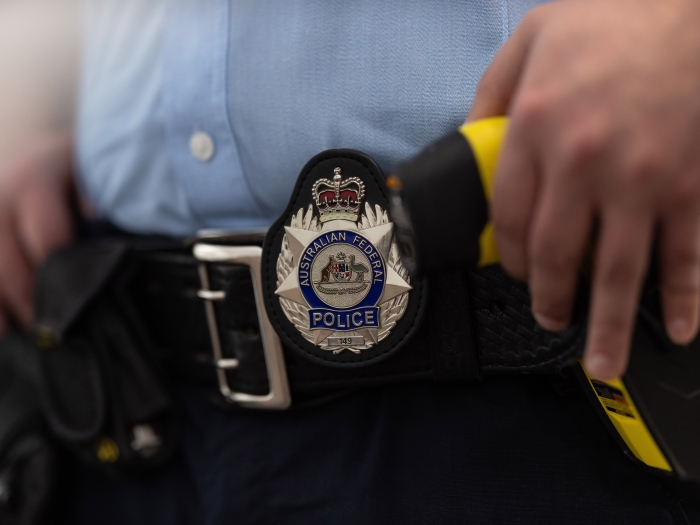If something doesn't add up, speak up by calling the National Security Hotline on1800 123 400 and help keep Australia safe from terrorism.
About this crime type
About this crime
The threat from terrorism in Australia is enduring, increasingly complex and diversified. Individuals who get involved with extremists come from a range of social backgrounds. This means every potential terrorist is influenced differently. Investigating terrorism is complex, as no 2 situations are the same.
Regardless of their ideology, terrorists' methods are constantly changing and evolving. This means we must be alert, aware and adaptable to changes in the global security environment.
Terrorism can happen anywhere in Australia. Violent extremism and radicalism are on the rise. This includes both religious and ideologically motivated violent extremist ideologies.
We continue to investigate and disrupt both homegrown terrorism and terrorism overseas that impacts Australians.
Our terrorism investigations also include:
- High-Risk Terrorist Offenders (HRTO)
- financing terrorism
- suspected terrorism-related kidnap for ransom
- suspected terrorism-related antisemitism (Special Operation Avalite).
Terrorism overseas
Conflicts in places like Syria, Iraq, the Middle East and Ukraine impact Australia and its citizens. Some Australians have travelled to these locations to engage in armed conflict. This means there could be Australians who may have committed terrorism offences.
It is a crime to:
- engage in fighting with a terrorist organisation or military group that isn't a foreign country's military
- fund, train or recruit someone to fight overseas
- supply weapons to or fund a terrorist organisation.
When Australians come home from fighting overseas, they may bring dangerous new skills and networks. These pose a threat to our national security.
We work to:
- prevent Australians from joining overseas conflicts to engage in hostile activities
- manage the threat of foreign fighters returning to Australia
- strengthen relationships with domestic and international partners and communities to counter extremism
- identify and disrupt radicalisation
- monitor trends and adapt to the fluid and dynamic nature of terrorism
- mitigate the risk that convicted terrorist offenders pose to the Australian community.
Financing terrorism
Under Division 103 of the Criminal Code Act 1995 (Cth), it's illegal to finance terrorism.
A person finances terrorism when they:
- intentionally collect or provide money
- are reckless about whether the money will be used to facilitate or engage in a terrorist act.
Terrorism financing generally falls into 2 broad categories:
- direct costs required to fund terrorist attacks
- funding required to maintain a terrorist network, organisation or cell that includes foreign terrorist fighters.
Direct costs of terrorist attacks include travel, explosive materials, weapons and vehicles. The amount of money required for a terrorist attack can be quite small. Many attacks have been conducted with just a few hundred dollars.
Ongoing funding is generally used to recruit members, provide training, promote ideology, fund general infrastructure and living costs, and support the families of terrorists.
Terrorism funding may come from legitimate sources, criminal activities or both. Legitimate sources may include donations or gifts of cash or other assets to organisations, such as charities, which are used to support terrorist activities.
Terrorism funding uses similar techniques to money laundering to avoid detection.
National Security Hotline

Crime Interrupted
We provided exclusive access to our case vault and this podcast series provides a detailed insight into how the AFP interrupts the most serious of crimes.

Our work
Our work
Australia's laws against terrorism are mostly found in Part 5.3 of the Criminal Code Act 1995 (Cth). Laws against foreign incursion and recruitment are in Part 5.5 of the Act.
The Act allows us to protect the public from terrorist threats through:
- control orders
- preventative detention orders.
To enforce these laws, our counter-terrorism teams play a lead role in Australia's national security approach. We coordinate and collaborate with other agencies for a unified effort.
Counter-terrorism focuses on disrupting radicalisation and violent extremism. These are the beliefs and actions of people who support or use violence to achieve ideological, religious or political goals.
Our Counter Terrorism and Special Investigations Command has 2 main functions to address risks and threats within the community:
- Joint Counter-Terrorism Teams
- Counter-Terrorism Enduring Risk Investigations.
Joint Counter-Terrorism Teams
The Joint Counter-Terrorism Teams are a partnership between:
- the AFP
- the respective state or territory police
- Australian Security and Intelligence Organisation (ASIO)
- in New South Wales, the NSW Crime Commission.
We work closely with our partners to identify and investigate terrorist activities in Australia. We emphasise preventing any action or attacks, including disrupting terrorism financing.
Counter-Terrorism Enduring Risk Investigations
Counter-Terrorism Enduring Risk Investigations help to identify and address the risk posed by High-Risk Terrorist Offenders (HRTOs) when released into the community. They also manage and enforce compliance with any HRTO’s post-sentence orders.
We work closely with Australian Government bodies and state and territory partners to address and mitigate the risk posed by HRTOs.
Joint Threat Financing Group
The Joint Threat Financing Group (JTFG) is an AFP-led team of financial specialists from the AFP and AUSTRAC (Australian Transaction Reports and Analysis Centre). It has offices in Brisbane, Canberra, Melbourne and Sydney.
The JTFG works to combat terrorist and threat financing. Its work includes:
- analysing financial information
- triaging financial data to identify terrorism financing-related matters and targets involved in terrorist activities
- providing advice to national and global decision-makers on financial indicators of terrorist activity.
The JTFG works closely with Australian-based banking and financial organisations, as well as other government departments, including:
- Australian Border Force
- Australian Criminal Intelligence Commission
- Australian Taxation Office
- AUSTRAC
- Services Australia (Centrelink).
It also works with overseas law enforcement and national security agencies.
Report a crime or concern
We can investigate Commonwealth crimes (sometimes called federal crimes) and crimes that take place in the Australian Capital Territory. What best describes the crime you want to report or what you want to tell us about?
How to report
Before submitting a report read our terrorism-related information to report accurately
If you have witnessed or suspect terrorist activity, call the 24-hour National Security Hotline1800 123 400.
You can report some terrorism-related crimes to us if they are Commonwealth crimes, such as financing terrorism through fraud.
For non-urgent terrorism-related matters, send us information by filling out our
Report a crime form
In an emergency, call000 for police, fire brigade or ambulance.
Join us
Join us
Use your analytical or investigative skills to fight terrorism and keep Australians safe.
It's a constantly changing threat picture, so no 2 days are the same. And there's a variety of roles on offer across our teams.
You'll investigate, disrupt and prevent terrorist activities in Australia and offshore. It's challenging and rewarding work that makes Australia a safer place.
If active investigations interest you, and you have advanced critical thinking skills, you could become a counter-terrorism investigator.
If you have a policing or law enforcement background, you could join our team of intelligence officers and analysts. You'll use your analytical and research skills to understand the global threat picture.
Forensic accountants and cybercrime investigators work to support our complex investigations. To become a forensic accountant, you'll need tertiary qualifications in accounting plus specialist knowledge of the field.
Find out more about these roles:
- Investigator – Counter Terrorism
- Team member – Intelligence Operations
- Forensic accountant
- Investigator – Cybercrime.
You can apply for positions when they are advertised on our Jobs portal.





